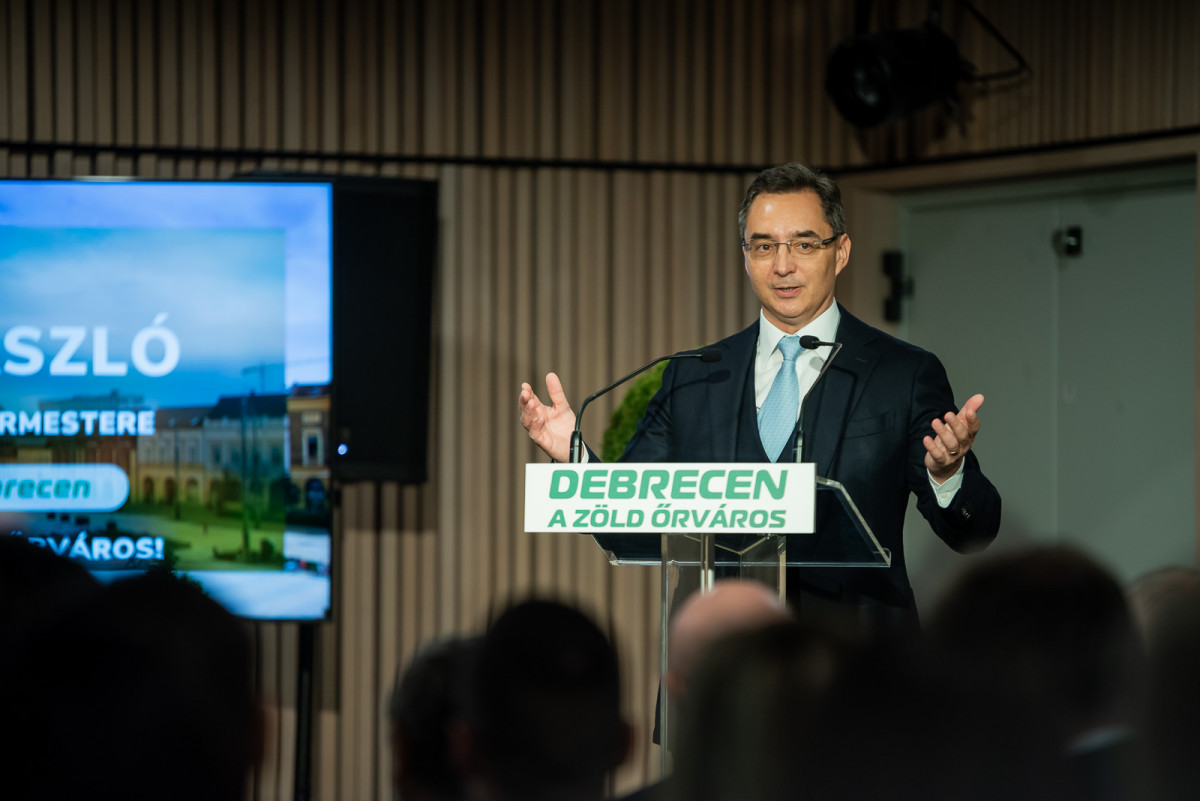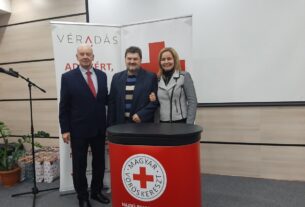A conference entitled Debrecen a Zöld Őrváros was held at the Csokonai Forum on November 28th, which ended with an important announcement. In his welcoming speech, Mayor László Papp said that climate change will not spare us either, but we have the knowledge and the technological achievements that our generation can use to mitigate the harmful effects of extremes, and perhaps even prevent them.
He reminded that in recent years, many developments and investments have been implemented, all of which contributed to developing, but at the same time protecting Debrecen’s environment and natural treasures. “Today, Debrecen is a city that is a key player in the green transition both globally and locally. Our city also has an impact on the world economy thanks to the investments taking place here, at the same time, we have an outstanding role in Europe and thus globally in the green transition of transport, and we have an outstanding role in solving one of the most important challenges of the 21st century, the storage of green energy. Because green energy, which we can use sustainably and efficiently, does not exist without energy storage” – he emphasized.
He said that today there is no city in Hungary that has done as much for environmental protection, sustainability, and a clean environment as Debrecen. “Thanks to Civaqua, we have put our surface water management on a new foundation. By the end of the cycle, we will plant more than 10,000 trees in the city, surround our industrial areas with protected forests, create solar power plants, convert the city’s public transport to electric drive, and make our institutions more sustainable with energy efficiency renovations” – he listed.
“We see our nature as our common heritage, and this comes with a task: we have to leave it to our children and grandchildren in at least the same, but rather even better condition than we received it” – he underlined. He added that the individual measures would be worthless if it had not been possible to create a movement, a cohesive community thanks to the enthusiastic people of Debrecen who love their homes and are committed to environmental protection, and this is the Future of Debrecen.
István Láng, the director general of the National Directorate General of Water, said that the city that will be a green guard city will definitely have water as one of its fundamental segments. As he said, Debrecen is a high-lying area whose water management depends much more on local catchments than on large river catchments. Speaking about the Civaqua program, he said that the development started in the 1980s, but it took more than twenty-five years for the Tisza water to reach Debrecen today.
After that, the conference continued with the historical overview of professor emeritus Dr. György Dévai and the presentation of Dr. Csaba Aradi, the ecological expert of the Future of Debrecen. Then a podium discussion took place, which was also the first round table discussion of the JövőMűhely. The topic of the conversation was: What are we doing for the people of Debrecen? In this context, István Láng, Director-General of the National Directorate General of Water, Dr. Szabolcs Lengyel, Chief Scientific Advisor of the Coordination Research Center for Biodiversity, Water Management and Climate Change, Dr. István Grigorszky, Head of the Department of Hydrobiology of the Faculty of Natural Sciences of the University of Debrecen, and László Kóthay, hydraulic engineer and former Secretary of State for Water Affairs, shared the his thoughts.
The joint initiative of the Future of Debrecen, Vosz (National Association of Entrepreneurs) and the Hajdú-Bihar County Chamber of Commerce and Industry was born in the spirit of cooperation and common thinking. The aim of the JövőMűhely is to discuss the current affairs of Debrecen, to discuss the topics of most concern to the people of Debrecen, and to present ways and solutions. Thus, there is no more suitable topic for the first Future Workshop than the Civaqua program. After a short break, Prof. Dr. Sándor Kéki, a member of the presidency of the working group responsible for the development of the Debrecen Environmental Monitoring System, and his professional deputy head stated that science was put at the service of the people of Debrecen when developing the Environmental Monitoring System. Together with his colleagues, the internationally recognized professor created the scientific foundations of the Environmental Monitoring System, which will soon be presented to the citizens of Debrecen.
Sándor Kéki added that the purpose of the Environmental Monitoring System is to present and monitor the biodiversity that determines the quality of life of the citizens of Debrecen. “The Environmental Monitoring System will monitor the state and changes of water, air, soil and biodiversity throughout the city. We can measure, for example, the extent to which the city’s air improves as a result of the afforestation program and Civaqua, and the biological improvement the presence of water results in.” He emphasized that the Environmental Monitoring System is actually a control system that can distinguish between industrial and residential emissions. This guarantees the safety of the people of Debrecen. The next speaker, Prof. Dr. István Szűcs, the professional leader of the Debrecen Environmental Protection Program working group, talked about the fact that Debrecen announced a new environmental policy in 2019. The Green Working Group was formed and together with the city leaders, they started to create and implement Debrecen’s long-term environmental protection program. This led to the creation of the “Future of Debrecen” movement.
“We don’t work for desks and drawers, we believe in active environmental protection: the flagship of this is the Civaqua program.”
István Szűcs underlined that the University of Debrecen and the city are jointly preparing the Environmental Protection Program of Debrecen, on the creation of which professors from Debrecen are working together with members of the Green Working Group. As a result, knowledge is put to good use in Debrecen. During the creation of the Program, they see that Debrecen is on solid ground in green matters and has long-term plans.
After that, on behalf of the creators of the program, he suggested to Mayor László Papp that Debrecen apply for the title of “Green Capital of Europe”, with the Environmental Protection Program as its basic document. István Szűcs concluded his presentation with the idea that “Debrecen should be a green city where we rely on local knowledge to develop and guarantee the health, safety and well-being of the people of Debrecen!” Deputy mayor Ákos Balázs said at the end of the conference: “Debrecen is a green guard city and also a green city of the future. The goal of the city is to build a healthy and green city, to give our children a developing, safe and green Cívisváros.”
The deputy mayor emphasized that the city’s residents are proud of the civic identity and its traditions. An important part of this process is for the city to achieve its goals while implementing sustainability and green aspects in all areas of life. In terms of nature protection, Civaqua is the solution, in the field of mobility, electric buses powered by green energy, and in the economic field, green industry and green energy storage are the solution. Ákos Balázs added that Debrecen has proven several times throughout its history that, as a guard city, it looks after its important national and urban values and its citizens. In every era, it relies on local knowledge and a high degree of cooperation, because these are the basic laws of the city.
Regarding the Civaqua program, he emphasized that the investment is a symbol of the fact that dreams come true in Debrecen. The green approach of city management is inherited, as it is passed down from generation to generation. Ákos Balázs stated: “Our green policy is not based on ideology or party. Debrecen is the first for us!”
debreceninap.hu


















